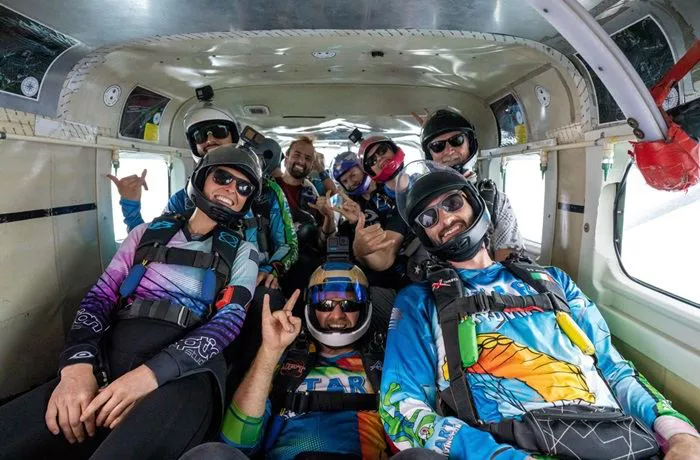Skydiving is an exhilarating extreme sport that offers an unparalleled rush of adrenaline and breathtaking views from high altitudes. For many, the thrill of jumping out of a plane and experiencing the free fall before deploying a parachute is a bucket list adventure. However, one of the most common questions potential skydivers have is about the age requirements for participating in this activity. In this article, we will delve into the specifics of age limits for skydiving, exploring both the minimum and maximum ages, as well as the factors that influence these restrictions.
Skydiving is not just about jumping out of a plane; it requires a combination of physical fitness, mental preparedness, and adherence to safety protocols. The sport involves a range of activities, from tandem skydiving for beginners to more advanced forms like freestyle and formation skydiving. Each type of skydiving has its own set of requirements and considerations, particularly when it comes to age.
How Okd Do You Have to Be to Go Skydiving?
Minimum Age for Skydiving
The minimum age for skydiving varies depending on the country and the type of jump. In most places, the minimum age for a tandem skydive, which is the most common type for beginners, is 18 years old. However, some skydiving centers may allow younger participants under certain conditions. For instance, in the United States, the United States Parachute Association (USPA) recommends that tandem skydivers be at least 18 years old, but some centers might allow 16- or 17-year-olds to jump with parental consent and under specific conditions.
For solo skydiving, where the individual jumps without being attached to an instructor, the minimum age is typically higher. In many countries, you must be at least 18 years old to obtain a skydiving license, which requires completing a series of training jumps and passing a certification exam.
Maximum Age for Skydiving
While there is no strict maximum age limit for skydiving, there are health and fitness considerations that become more significant as one ages. Many skydiving centers have no upper age limit for tandem jumps, provided the participant is in good health. However, for solo skydiving, the physical demands and the need for quick reflexes mean that older skydivers may face more stringent health checks.
The decision to allow older individuals to skydive often depends on their overall health and fitness level. Skydiving centers typically require participants to undergo a medical examination if they have any health concerns or are over a certain age, usually around 60 or 70 years old. This is to ensure that they can safely withstand the physical stresses of the jump, including the intense G-forces during free fall and the sudden deceleration upon parachute deployment.
Factors Influencing Age Restrictions
Several factors influence the age restrictions for skydiving:
Physical Health: Skydiving requires a certain level of physical fitness. Participants must be able to withstand the forces of free fall and the landing. Older individuals or those with health issues may need to undergo medical clearance before jumping.
Mental Preparedness: Skydiving can be mentally demanding, especially for first-time jumpers. Participants need to be able to follow instructions and remain calm under pressure. This is crucial for both safety and enjoyment.
Safety Protocols: Skydiving centers follow strict safety protocols to minimize risks. These protocols include age restrictions to ensure that participants are physically and mentally capable of handling the experience safely.
Insurance and Liability: Insurance policies often play a role in determining age limits. Some policies may not cover participants beyond a certain age, which can influence a skydiving center’s decision on who to allow to jump.
Preparing for Skydiving at Any Age
Whether you’re a young adult or an older individual, preparing for skydiving involves several steps:
Physical Conditioning: Engage in regular exercise to improve your overall fitness. This will help you handle the physical demands of the jump more effectively.
Mental Preparation: Understand what to expect during the jump. Watching videos, talking to experienced skydivers, and learning about the safety procedures can help reduce anxiety.
Choosing the Right Center: Select a reputable skydiving center with experienced instructors and a good safety record.
They will guide you through the process and ensure that you are prepared for the experience.
Health Checks: If you have any health concerns, consult with your doctor before booking a skydive. Some conditions may require special clearance or precautions.
Conclusion
Skydiving is an adventure that can be enjoyed by people of various ages, provided they meet the necessary health and safety criteria. While there are minimum age requirements, particularly for solo jumps, there is no strict maximum age limit for tandem skydiving, as long as participants are in good health. Whether you’re looking to experience the thrill of skydiving for the first time or continue enjoying it as you age, understanding the age requirements and preparing appropriately will ensure a safe and enjoyable experience.
In conclusion, skydiving offers a unique opportunity for adventure-seekers of all ages. By understanding the age restrictions and preparing both physically and mentally, individuals can enjoy this exhilarating sport while ensuring their safety.
Whether you’re 18 or 80, skydiving can be a life-changing experience that provides unforgettable memories and a sense of accomplishment.

